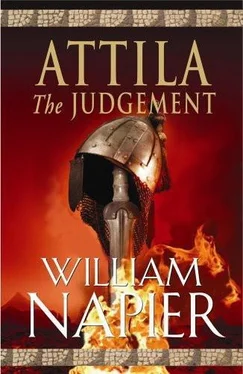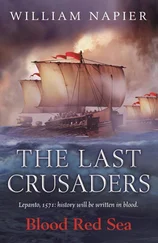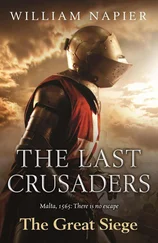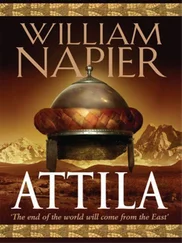William Napier - The Judgement
Здесь есть возможность читать онлайн «William Napier - The Judgement» весь текст электронной книги совершенно бесплатно (целиком полную версию без сокращений). В некоторых случаях можно слушать аудио, скачать через торрент в формате fb2 и присутствует краткое содержание. Жанр: Исторические приключения, на английском языке. Описание произведения, (предисловие) а так же отзывы посетителей доступны на портале библиотеки ЛибКат.
- Название:The Judgement
- Автор:
- Жанр:
- Год:неизвестен
- ISBN:нет данных
- Рейтинг книги:5 / 5. Голосов: 1
-
Избранное:Добавить в избранное
- Отзывы:
-
Ваша оценка:
- 100
- 1
- 2
- 3
- 4
- 5
The Judgement: краткое содержание, описание и аннотация
Предлагаем к чтению аннотацию, описание, краткое содержание или предисловие (зависит от того, что написал сам автор книги «The Judgement»). Если вы не нашли необходимую информацию о книге — напишите в комментариях, мы постараемся отыскать её.
The Judgement — читать онлайн бесплатно полную книгу (весь текст) целиком
Ниже представлен текст книги, разбитый по страницам. Система сохранения места последней прочитанной страницы, позволяет с удобством читать онлайн бесплатно книгу «The Judgement», без необходимости каждый раз заново искать на чём Вы остановились. Поставьте закладку, и сможете в любой момент перейти на страницу, на которой закончили чтение.
Интервал:
Закладка:
‘Much,’ said Lucius. ‘Britain may be an island, a sweet green island. But no man is an island.’
Attila leaned forward and spat. ‘For myself, and my People, and this great battle before us,’ he said, ‘the die is cast.’ His lips curled at the bitter allusion, and he added in a low voice: ‘By a King of Kings from Palestine
Two Empires were sown;
By a King of Terror from the East,
Two Empires were o’erthrown.’
The second Celt instantly responded, his voice still quiet but his every word clear: ‘When the wise man keeps his counsel,
The conqueror keeps his crown;
One empire’s birth was Italy,
The other was his own.’
Attila glared at him, jerking his reins up to his chest as if for protection. ‘What is that?’ he rasped. ‘What is that you say?’
Cadoc only smiled politely and said no more.
Instead, Lucius said, ‘He is a remarkable one for poetry, my son. I taught him much – old rhymes, verses, even snatches of ancient prophecy, supposedly!’ He gave a curt laugh, sceptical or ironic, it was impossible to say. ‘And do you know, he remembers every word. It is a gift of my people.’ He looked Attila in the eye, and then Orestes. ‘ Every word. ’
Attila’s horse was restless beneath him, side-stepping, champing at its bit, sensing his agitation. ‘Speak that verse once more. Repeat it to me,’ he rasped. ‘Speak!’ There were stormclouds over his face again, and beside him Orestes, too, seemed strangely perturbed. But father and son had already pulled their horses round and were walking back to the Roman lines.
‘Speak!’ Attila roared after them. ‘Damn you, brown-eyed poet!’
All along the Hun lines, his warriors levelled arrows at the backs of the departing riders, but Attila swept down an angry arm, and their bows were lowered.
Ahead of them, the distant Roman lines began to shimmer in the rising summer heat. Attila’s yellow, wolfish eyes seemed to shimmer, too, those ancient, glittering eyes which had seen all and known all and found no rest or contentment in all the world. Those eyes shimmered as if even he were deeply moved. The gallant Celtic war-band would soon meet its death here on these lonely Gallic plains, loyal unto death to an empire whose days were done, trampled beneath the hooves of two hundred thousand of his warriors. Had not Astur willed it long ago? ‘ Yet hard is the Gods’ will, My sorrows but increase, And I must weep, beloved, That wars will never cease’: an ancient song that someone he once knew used to sing to himself. And then it came to him, who it was who used to sing that ancient song to himself, softly, by firelight, in Italy long ago.
Then let it begin.
Or let it all fall.
Twenty or thirty yards off, Lucius reined in, turned sideways in his saddle, and spoke to Attila one last time.
‘By the way,’ he said, ‘your baggage wagons are burning. ’
Attila glanced back, and instantly began lashing his horse into motion, sorrow transformed into howling rage. From a mile or two behind the Hunnish horde, thick black smoke was roiling up high into the morning air.
9
Aetius had used his Batavian special forces, his superventores, exactly as they were supposed to be used, skilfully and in secrecy.
The single century of lightly armoured men had skirted the hill as soon as its possession was consolidated by the Palatine Guard, well-dug in around the summit. They had crawled along a drainage ditch, well wide of the Hun lines, running down to the river that formed Attila’s supposedly safe right flank. Safe enough from major attack or cavalry, true. But the Huns wrongly supposed their own fear of deep, strong rivers to be universal, and their focus was elsewhere.
The Batavians came across the river as swiftly as crocodiles across the serpent Nile, breathing through hollow reeds, swimming strongly. They slithered up through the sedge of the far bank, dripping like watery ghouls, duckweed stuck to their lightweight leather cuirasses. Their backpacks dripped, too, but the contents were still as dry as desert sand, triple-wrapped in oilcoth. They crept along the riverbank until they reached the baggage wagons.
The great high-wheeled Hunnish wagons were entirely unprotected by warriors, although crowded on top of them were old men, women and children, gazing southwards, munching strips of smoked meat, eagerly waiting for the battle to begin. On the nearest wagon, the superventores noted, chuckling to themselves, one old woman was even making the best use of this tedious time before the fight by doing sewing repairs to a leather jerkin.
Shock and terror would clear them off quickly enough. And then speed of retreat would be everything.
The eighty men came screaming and yelling up through the reedbeds, muddy and plastered with weed, swords whirling. The women took one horrified look at these river-demons, snatched their infants down from the wagons and fled. The superventores were at the wagons in an instant, kneeling down behind the solid wooden wheels emptying their backpacks, plastering the dry old wooden wheels with a special mix of naptha, sulphur and highly refined oil on wads of fresh lambs’ wool, sticky and murderously flammable. Right across the rear of the Hun lines the wagons stretched away, piled high with the loot of half the civilised world. There might have been a hundred, no, three or four hundred – they couldn’t possibly damage them all. But by the time word got to the nearest Hun warriors, sitting their horses in the rear battle-lines, the Batavians had fixed up over thirty wagons.
A couple of hundred horse-warriors came galloping furiously back across the grass towards them.
The commander of the superventores knelt, flipped open his tinderbox and flicked the wheel.
‘Sir, we’re in range!’
The first arrows hit the ground nearby. A junior lieutenant held out a wooden staff topped with a blob of pitch and the commander lit it.
‘Now run!’ he roared. ‘The rest of you – to the river!’
The main body sprinted for the water, crouching low, while the lieutenant dashed along the line of wagons with the flaming torch extended. Every time it brushed against a treated wheel, the wagon exploded into flames like a bone-dry hayrick.
The Huns were bewildered and indecisive, some making towards the burning wagons intending to extinguish them and save the loot, though God only knew how. That moment of confusion was the lieutenant’s chance of escape, and he took it, sprinting towards the river, dashing beneath a low-hanging alder for cover even as arrows sliced through the leaves around him, and diving headlong into the river. Horsemen arrived on the bank above, howling with fury, their horses champing, tossing their brutish heads, fighting against entering such a fast-moving current when unable to see the bottom. The riders drew back their bows and arrows slapped into the water but instantly lost trajectory, flattening out across the surface like skimmed pebbles or spinning round to face the powerful current. In any case, the Batavians were already down in the murky depths, lungs forcibly emptied, navigating only by the feel of the current dragging them back to safety, swimming like tritons with grins across their water-stretched faces.
As Aetius well knew, such flamboyant tactics had absolutely no effect on the material progress of the battle, but they could do wonders for morale. His lines cheered wildly as the black smoke billowed up into the air behind the Hun army, and they saw the Hunnish leader himself, fearsome Attila, galloping furiously back to view the damage.
‘An ostentatious little jape,’ muttered Aetus, ‘but a useful one.’
Tatullus grinned. ‘What’s he wasting his time for? He needs to get on with it.’ He jerked his head right.
Читать дальшеИнтервал:
Закладка:
Похожие книги на «The Judgement»
Представляем Вашему вниманию похожие книги на «The Judgement» списком для выбора. Мы отобрали схожую по названию и смыслу литературу в надежде предоставить читателям больше вариантов отыскать новые, интересные, ещё непрочитанные произведения.
Обсуждение, отзывы о книге «The Judgement» и просто собственные мнения читателей. Оставьте ваши комментарии, напишите, что Вы думаете о произведении, его смысле или главных героях. Укажите что конкретно понравилось, а что нет, и почему Вы так считаете.












